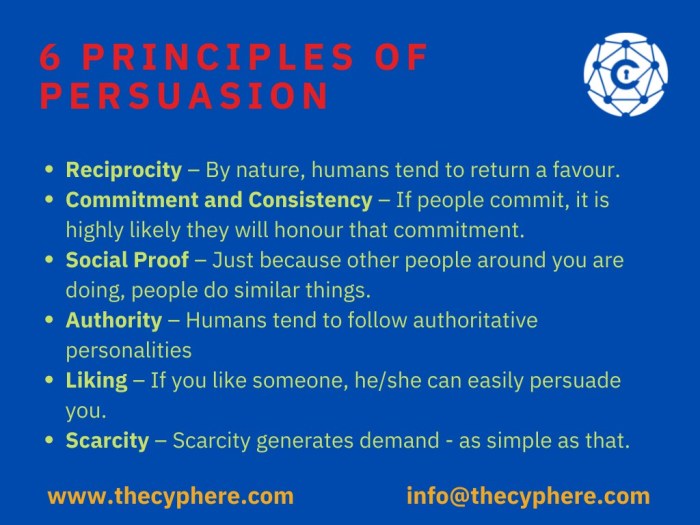The art of manipulating influencing or deceiving – The art of manipulating, influencing, or deceiving is a complex and multifaceted phenomenon that has captivated the attention of scholars and practitioners alike. This engaging exploration delves into the intricacies of these interconnected concepts, examining their techniques, applications, and ethical implications.
From the subtle nuances of persuasion to the overt tactics of manipulation, this discourse unveils the dynamics of human behavior and its profound impact on individuals and society.
Throughout this discourse, we will explore the various methods of manipulation, the principles of influence, and the forms and consequences of deception. We will analyze the role of communication in these processes, examining how verbal and nonverbal cues can be employed to shape perceptions and behaviors.
Moreover, we will investigate the relationship between power and manipulation, discussing how power can be leveraged to influence others and the ethical implications of such actions.
Manipulation and Its Techniques

Manipulation involves influencing or controlling others through deceptive or exploitative means. Its techniques vary, including:
Emotional Manipulation
- Guilt-tripping: Inducing feelings of guilt to elicit desired behaviors.
- Love-bombing: Showering someone with excessive affection to gain their trust and control.
- Gaslighting: Making someone doubt their own reality or sanity to gain power.
Psychological Manipulation
- Projection: Attributing one’s own negative qualities to others.
- Cognitive dissonance: Exploiting inconsistencies in someone’s beliefs to influence their actions.
- Framing: Presenting information in a way that influences how it is perceived.
Behavioral Manipulation, The art of manipulating influencing or deceiving
- Positive reinforcement: Rewarding desired behaviors to increase their frequency.
- Negative reinforcement: Removing negative consequences to encourage desired behaviors.
- Punishment: Imposing negative consequences to discourage undesired behaviors.
Influence: Building and Maintaining

Influence involves the ability to sway others’ opinions, decisions, or actions. Its principles include:
Building Rapport and Credibility
- Empathy: Understanding and relating to others’ emotions.
- Active listening: Paying undivided attention to what others say.
- Authenticity: Being genuine and trustworthy.
Persuasion and Negotiation
- Logical arguments: Using facts and evidence to support one’s position.
- Emotional appeals: Connecting with others’ emotions to gain support.
- Negotiation: Finding mutually acceptable solutions through compromise.
Deception: Forms and Consequences

Deception involves misleading or concealing information to gain an advantage. Its forms include:
Lying
- Fabrication: Inventing false information.
- Omission: Withholding relevant information.
- Exaggeration: Distorting facts to make them seem more favorable.
Half-Truths and Misrepresentation
- Half-truths: Telling part of the truth while concealing the rest.
- Misrepresentation: Distorting information without outright lying.
- Ambiguity: Using vague or misleading language to create confusion.
Consequences of Deception
- Trust erosion: Damaging relationships and reputations.
- Legal repercussions: Fraud, defamation, and other offenses.
- Moral dilemmas: Violating ethical principles and values.
FAQ Guide: The Art Of Manipulating Influencing Or Deceiving
What are the most common methods of manipulation?
Common methods of manipulation include emotional appeals, guilt-tripping, gaslighting, and leveraging power imbalances.
How can we protect ourselves from manipulation?
To protect ourselves from manipulation, we can develop critical thinking skills, practice self-awareness, set boundaries, and seek support from trusted individuals.
What are the ethical implications of using deception?
Deception can have serious ethical implications, as it can undermine trust, damage relationships, and violate the autonomy of others.
